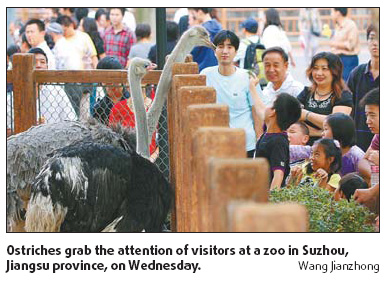Zoo visitors cause stress for animals
The eight-day national holiday was relaxing and fun for many Chinese, but not for many of the animals in the Xiangjiang Zoo in Guangzhou.
Some of the animals suffered stress due to the throngs that crowded the zoo nearly every day during the holiday, according to workers at the zoo.
Visitors took thousands of photos, subjecting the animals to nearly constant flashbulbs. Many people tapped or banged on the cages, called at the animals and created noise from sunrise to sunset.
Others fed the animals, in some cases food that the animals should not eat. Still others left behind trash that some animals tried to eat.
Many animals were frightened and hid much of the day, refusing to come out, local newspaper New Express Daily reported.
Koala bears from Australia covered themselves up in the grass. A panda crouched in a corner. A gibbon, irritated by a child's teasing, rushed to get out of the cage and nearly broke its arm. A little giraffe experienced a stomach disorder after being fed by a young couple. And some animals even experienced anorexia, workers said.
"We hope that visitors, while enjoying the time in the zoo, think about the animals and their welfare," a worker from the zoo said.
According to animal experts, people banging on cages would especially disturb baby animals. The stress can lead to their bodies changing color, anorexia and even death.
Some animals, like monkeys and bears, can hurt their stomachs after eating too much food offered by the visitors.
The worker also complained about littering by visitors.
Some animals, such as zebras and spotted deer, have been known to eat plastic bags dropped by visitors, and this could cause death, experts said.
"The supervision of the animals and education of the visitors are keys to solving the problems," said Ye Mingxia, director of communication in the Beijing Zoo.
Similar problems have happened at the Beijing Zoo, yet most visitors stopped when workers in the zoo asked them to, Ye said.
"We strengthened supervision during the holiday," Ye said. "We put up a lot of reminders and showed videos telling people not to feed animals, and we had more inspectors than usual."
Most visitors understood and cooperated upon being told not to feed them, Ye said.
"As for scaring the animals, we have inspectors and their job is to stop people from getting too close to the animals and reiterating that no flashbulbs are permitted," Ye said.
 0
0 







